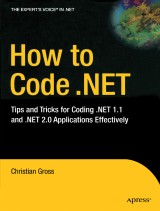Details

How to Code .NET
Tips and Tricks for Coding .NET 1.1 and .NET 2.0 Applications Effectively|
28,88 € |
|
| Verlag: | Apress |
| Format: | |
| Veröffentl.: | 22.12.2007 |
| ISBN/EAN: | 9781430202424 |
| Sprache: | englisch |
| Anzahl Seiten: | 232 |
Dieses eBook enthält ein Wasserzeichen.
Beschreibungen
<p>What is good code? Writing good code is really a question about what the code is trying to solve. (And good code is not to be confused with patterns because not all pieces of good code are patterns.) We debate about good code because there is not just a single piece of good code, but so many good pieces of code. And each good piece of code depends on the context in which it is used.</p>
<p><i>How to Code .NET: Tips and Tricks for Coding .NET 1.1 and .NET 2.0 Applications Effectively</i> provides solutions to certain problems. That is, specific problems. This book provides detailed, authoritative explanations of good .NET coding techniques. It's based on award-winning material that author <strong>Christian Gross</strong> has previously presented at conferences throughout the U.S. and Europe. What's more, the author is at the forefront of the .NET technology wave and an acknowledged expert on the subject of .NET coding style and techniques.</p>
<p><i>How to Code .NET: Tips and Tricks for Coding .NET 1.1 and .NET 2.0 Applications Effectively</i> provides solutions to certain problems. That is, specific problems. This book provides detailed, authoritative explanations of good .NET coding techniques. It's based on award-winning material that author <strong>Christian Gross</strong> has previously presented at conferences throughout the U.S. and Europe. What's more, the author is at the forefront of the .NET technology wave and an acknowledged expert on the subject of .NET coding style and techniques.</p>
What This Book Is About.- .NET Runtime and Framework Related Solutions.- Value Types and Reference Types Can Be Confused.- What are Delegates?- What Does the Yield Keyword Really Generate?- Versioning Assemblies.- Loading Assemblies Without Any Hassles Using A Utility Class.- Dynamically Loading and Unloading Assemblies.- Implementing GetHashCode Properly.- Think of .NET Generics as Black Boxes.- Figuring Out What Generic Methods Do.- Why For .NET Generics Do You Need the New and Class Keyword?- Text Related Solutions.- Converting a String to an Array and Vice Versa.- Parsing Numbers from Buffers.- When To Use StringBuilder.- Finding a Piece of Text within a Text Buffer.- Always Implement ToString.- Using a Disposable Type to Iterating the Results of Finding Multiple Pieces of Text within a Text Buffer.- Making ToString Generate Structured Output.- C# and Code Related Solutions.- Inheritance can be Used Effectively (instead of Interfaces only).- (Almost) Everything You Ever Wanted To Know About Implementing Interfaces.- Defining a Namespace, Class, and Interface Naming Convention.- Understanding the Overloaded Return Type and Property.- Null Is Not Always A Null.- Architecture, and Pattern Related Solutions.- Abstract Class Bridge Pattern Variation.- Nested Private Class Bridge Pattern Variation.- How to Effectively Deal with Placeholder Interfaces or Base Classes.- A Null Value is Not Always a Null State.- All the Essentials You Ever Wanted To Know About The Factory Pattern.- Don't Expose the Internal State of a Class.- Designing Consistent Classes.- Immutable Types are Scalable Type.- Understanding and Using Functors.- Avoiding Constructors Parameters without Identity.- Understanding and Implementing Singletons.- Testing Hard To Test Classes Using Mock Objects.
Christian Gross is a consultant with vast experience in the client/server world. He has consulted for Microsoft on DNA solutions, and he has held consulting positions with Daimler Benz, Microsoft, NatWest, and other major corporations. Gross was a contributor to Professional Active Server Pages, Professional SQL Server 6.5 Administration, Professional NT Internet Information Server Administration, and Programming Microsoft Windows 2000 Unleashed. He is the author of A Programmer's Introduction to Windows DNA.
Provides detailed, authoritative explanations of good .NET coding techniques Based award-winning material that the author has presented at a conferences throughout the US and Europe The author is at the fore-front of the .NET technology wave, and an acknowledged expert on the subject of .NET coding style and techniques
<P>What is good code? The answer is that there is no single answer to good code because it is relative. This book provides specific guidelines for well-written code in the .NET context. The contents are based on award-winning material the author has presented at conferences throughout the US and Europe. Writing good code is really a question of what the code is trying to solve. There is debate about good code because there is not a single good piece of code, but many good pieces of code, each depending on the context that it is used. The author, an acknowledged expert on the subject of .NET coding style and techniques, explains that good code results from using patterns, but that not all good pieces of code are patterns. Patterns are a mechanism used to generically describe how to solve specific problems. The problem that a pattern solves is described by its context.</P>
Diese Produkte könnten Sie auch interessieren:

A Study of Tackling Fake News with Machine Learning Approaches

von: Balamurugan Rengeswaran, Vidhya VP

18,99 €

Transformación de manuscritos por medio de procesadores de texto. Del documento digital a su versión impresa

von: Damir-Nester Saedeq

13,99 €














